🐕 Are Australian Shepherds Hypoallergenic? No, here's why❌ Quick Answer: No, Australian Shepherds are NOT hypoallergenic Australian Shepherds have a double coat that sheds heavily, particularly during seasonal changes. They produce significant amounts of dander and shed year-round, making them unsuitable for people with dog allergies. While they're wonderful, intelligent, and loyal companions, they rank low on the hypoallergenic scale.
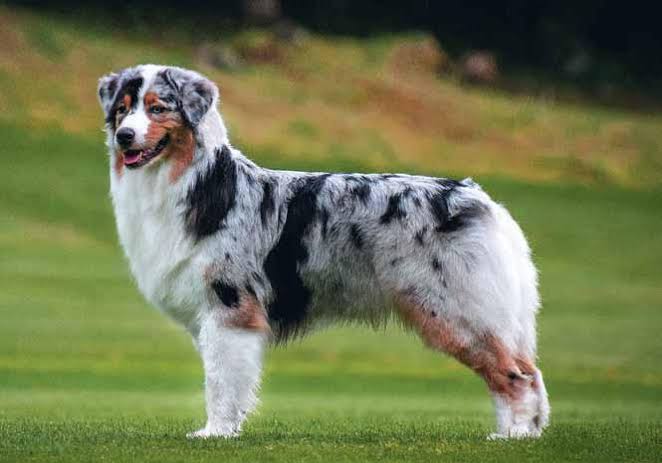
Australian Shepherds are stunning dogs with beautiful coats, but their heavy shedding makes them challenging for allergy sufferers 🐾 Australian Shepherd Quick FactsHypoallergenic Level: ❌ Low
Shedding: ⚠️ Heavy
Weight: 18-29 kg (40-65 lbs)
Height: 46-58 cm (18-23 inches)
Coat Type: Double Coat
Grooming Needs: 🔴 High
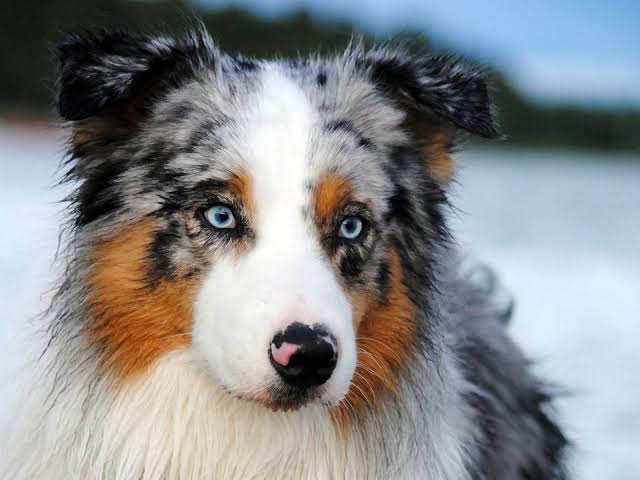
The expressive face of an Australian Shepherd showcases their intelligence and charm 🔬 What Makes a Dog Breed Hypoallergenic?↑ Back to MenuUnderstanding hypoallergenic qualities is essential before we discuss why Australian Shepherds don't fit this category. No dog breed is 100% hypoallergenic, but certain breeds produce fewer allergens than others. The main culprits of dog allergies are not actually the fur itself, but rather proteins found in: 🔸 Dander: Microscopic skin flakes that become airborne 🔸 Saliva: When dogs lick themselves, proteins dry on their coat 🔸 Urine: Contains allergenic proteins that can spread Hypoallergenic breeds typically share these characteristics: minimal shedding, single coat structure, low dander production, and hair that grows continuously rather than shedding seasonally. Breeds like Poodles, Bichon Frises, and Portuguese Water Dogs exemplify these traits. 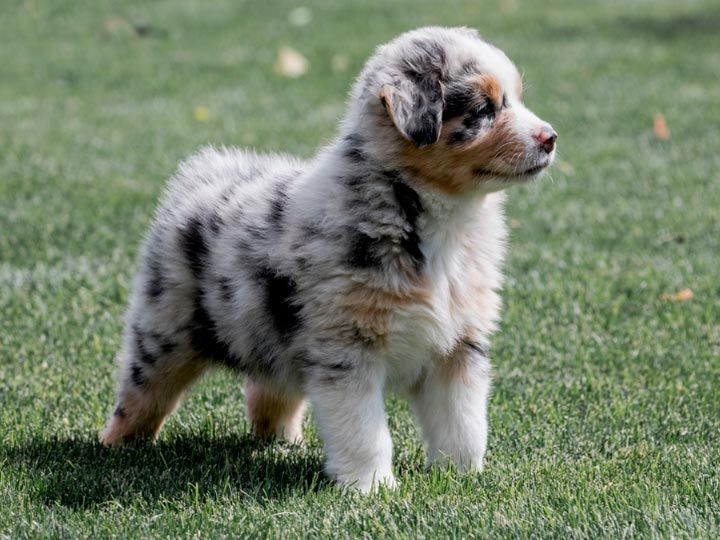
Even adorable Australian Shepherd puppies will grow into heavy shedders as they develop their full double coat ❌ Why Australian Shepherds Are NOT Hypoallergenic↑ Back to MenuAustralian Shepherds possess several characteristics that make them particularly challenging for allergy sufferers. Let's examine why this magnificent breed ranks low on the hypoallergenic scale. 🌟 Double Coat StructureAustralian Shepherds have a dense double coat consisting of a soft, insulating undercoat and a longer, weather-resistant outer coat. This double-layer system was developed to protect them from harsh weather conditions while herding livestock. However, this same feature makes them prolific shedders. The undercoat sheds significantly, especially during spring and fall "blowing" seasons when they release their winter or summer coat. 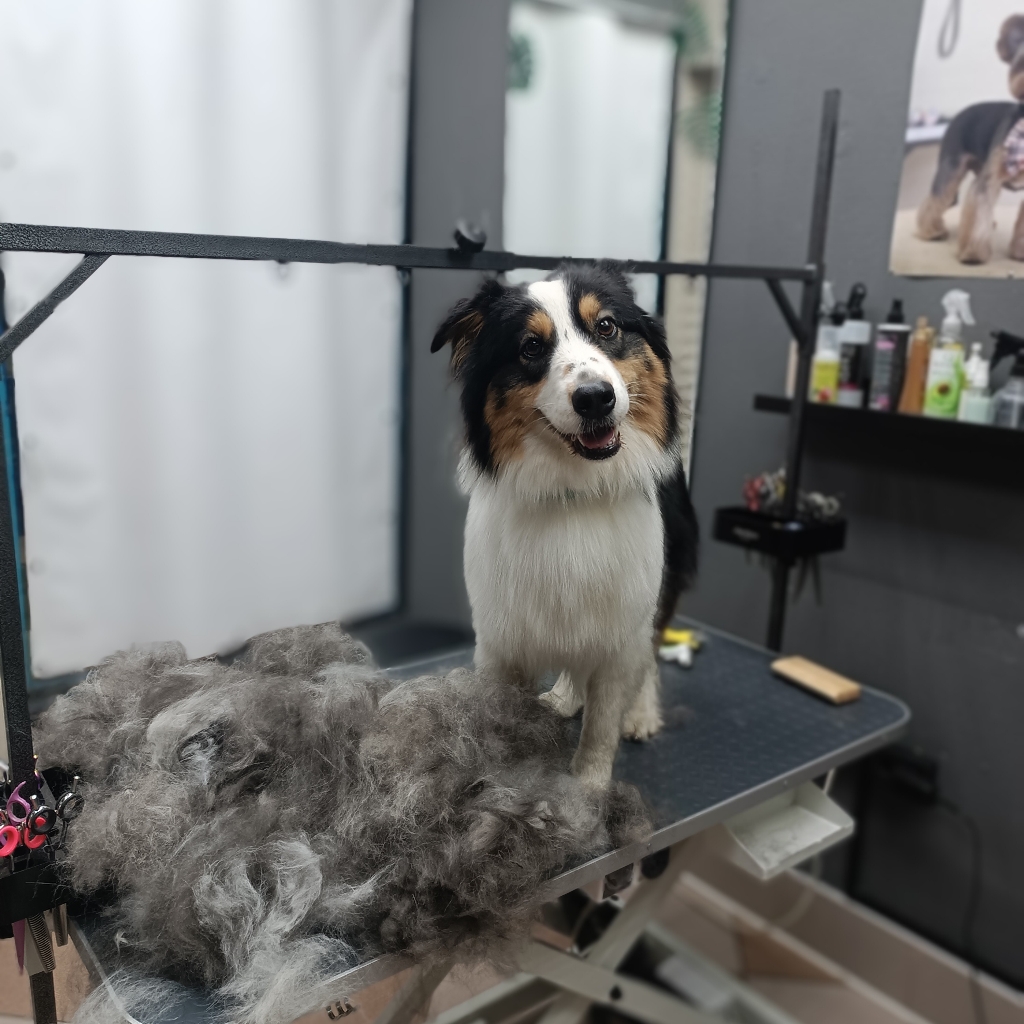
Regular grooming is essential for Australian Shepherds, but it also means exposure to significant amounts of loose fur and dander 💨 Year-Round SheddingUnlike some breeds that shed minimally, Australian Shepherds shed continuously throughout the year. During seasonal changes, particularly spring and autumn, their shedding intensifies dramatically. Owners often describe finding fur on furniture, clothing, and virtually every surface in their home. This constant release of hair carries dander particles into the environment, triggering allergic reactions. 🦠 High Dander ProductionThe combination of their active lifestyle and double coat results in substantial dander production. Australian Shepherds are energetic working dogs who love outdoor activities. As they move, play, and shake their coats, they release clouds of microscopic dander particles that can remain airborne for hours and settle on surfaces throughout your home. ⚠️ Important for Allergy Sufferers: If you have moderate to severe dog allergies, an Australian Shepherd will likely trigger consistent allergic reactions. The breed's shedding pattern and dander production make them one of the more challenging breeds for people with allergies. 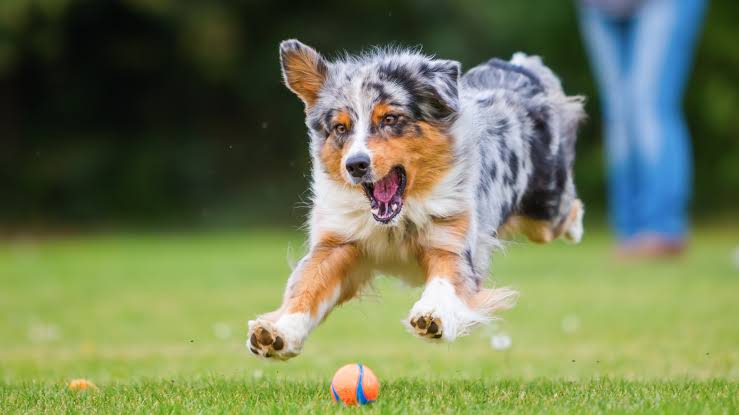
The high-energy nature of Australian Shepherds means more activity, which translates to more dander dispersal throughout your home 🤧 Living with an Australian Shepherd When You Have Allergies↑ Back to MenuWhile Australian Shepherds aren't hypoallergenic, some allergy sufferers with mild sensitivities have successfully lived with them by implementing strict management strategies. This requires significant commitment and may not work for everyone. 🏡 Environmental Management StrategiesCreate dog-free zones: Designate your bedroom and other key areas as strictly off-limits to reduce allergen concentration where you spend significant time, particularly during sleep when your immune system is more vulnerable. Invest in high-quality air purification: HEPA air purifiers can capture airborne dander particles effectively. Place them in frequently used rooms and run them continuously for best results. Establish rigorous cleaning routines: Vacuum with a HEPA-filter vacuum at least three times weekly, mop hard floors regularly, and wash all bedding and soft furnishings frequently to remove accumulated dander. 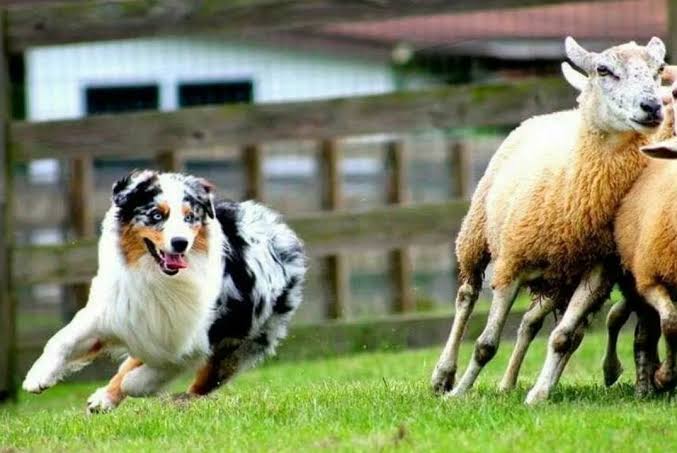
Australian Shepherds excel at their original purpose - herding livestock - which showcases their intelligence and work ethic ✂️ Grooming ProtocolsAustralian Shepherds require extensive grooming to manage shedding and dander. Ideally, have a non-allergic family member handle grooming duties outdoors to prevent allergen accumulation indoors. Brush your Aussie daily during peak shedding seasons and at least three times weekly year-round. Regular bathing helps reduce dander, but don't overdo it. Bathing every four to six weeks with a quality dog shampoo removes loose hair and dander without stripping essential oils from their coat. More frequent bathing can actually increase skin dryness and dander production. 💡 Pro Tip: Consider professional grooming services where trained groomers can thoroughly remove undercoat and dander in a controlled environment away from your home. 🔍 Discover Truly Hypoallergenic AlternativesIf you love the intelligence and energy of Australian Shepherds but need a more allergy-friendly option, exploring genuinely hypoallergenic breeds might be your best path forward. Each person's allergies are unique, and finding the perfect match requires understanding your specific needs. Answer a few quick questions and get personalized breed recommendations based on your lifestyle and allergy needs! 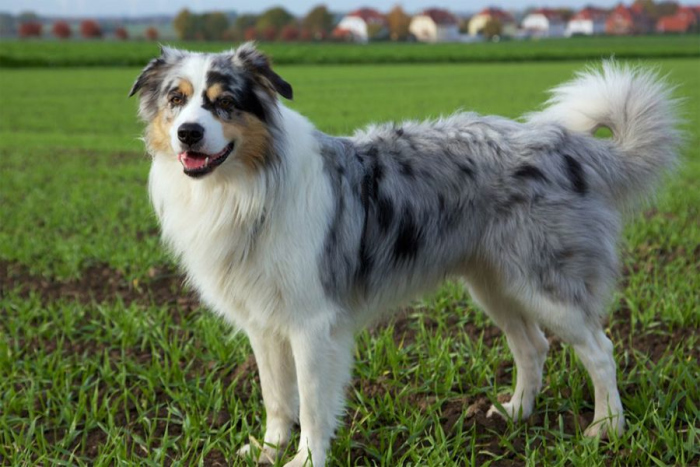
The beauty and athleticism of Australian Shepherds shine in outdoor settings where they thrive 🔄 Hypoallergenic Alternatives to Australian Shepherds↑ Back to MenuIf you're drawn to Australian Shepherds for their intelligence, trainability, and energetic personality, several hypoallergenic breeds offer similar characteristics without the allergy concerns. Let's explore some excellent alternatives.
🌟 Best Match for Aussie Lovers: Standard Poodles often top the list for allergy sufferers seeking Australian Shepherd qualities. They're exceptionally intelligent, highly trainable, athletic, and excel in various dog sports. Their non-shedding coat makes them significantly more suitable for allergy sufferers while maintaining the active, engaged personality that Aussie enthusiasts appreciate. 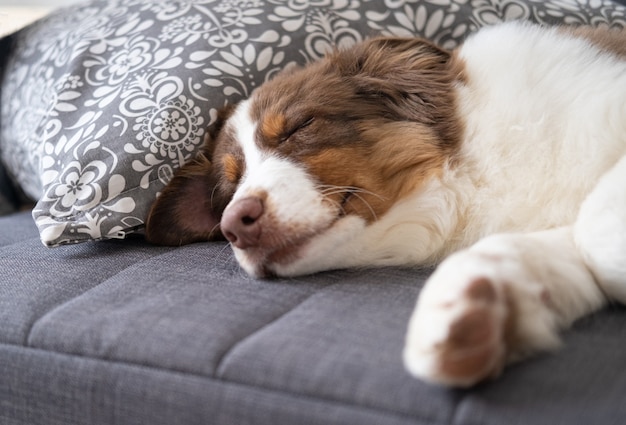
Australian Shepherds love being close to their families, but their shedding means furniture requires frequent cleaning 💡 Tips for Current Australian Shepherd Owners with Allergies↑ Back to MenuIf you already have an Australian Shepherd and are managing allergies, these practical strategies can help minimize symptoms while keeping your beloved companion. 🏠 Home Environment OptimizationRemove carpeting where possible: Hard flooring surfaces like hardwood, tile, or laminate are much easier to keep allergen-free than carpets, which trap dander deep in their fibers. Use allergen-proof covers: Encase mattresses and pillows in allergen-barrier covers to create a protective sleep environment. Maintain optimal humidity levels: Keep indoor humidity between 30-50% to reduce dander dispersal and prevent it from becoming airborne easily. 👤 Personal Allergy ManagementWash hands immediately after petting your Australian Shepherd and avoid touching your face before washing. This simple habit significantly reduces allergen transfer to sensitive areas like eyes and nose. Change clothes after extended contact with your dog, especially after outdoor activities or play sessions. Keep a dedicated set of "dog clothes" for activities with your Aussie. Work with an allergist: Many people find relief through immunotherapy (allergy shots) or daily antihistamines. Medical management can make coexisting with an Australian Shepherd much more comfortable. 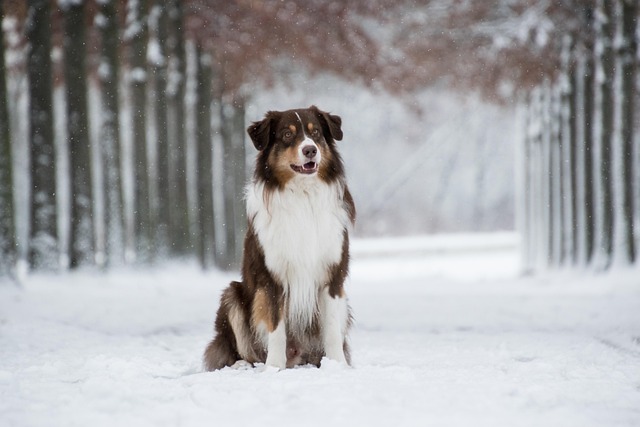
Australian Shepherds thrive in various climates, with their double coat providing excellent insulation in cold weather 🍽️ Dietary ConsiderationsA high-quality diet rich in omega-3 fatty acids can improve coat health and reduce excessive shedding and dander production. Consult your veterinarian about adding fish oil supplements or switching to a premium food formulated for skin and coat health. ⚠️ Reality Check: Even with all these measures, some allergy sufferers simply cannot comfortably live with Australian Shepherds. If you're experiencing severe or worsening symptoms despite interventions, prioritize your health. Rehoming through a responsible breed rescue ensures your dog finds a suitable forever home. 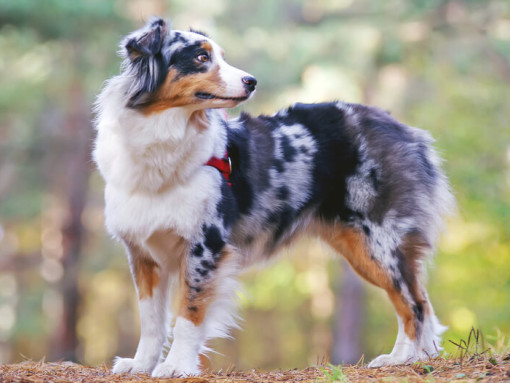
The magnificent appearance and confident stance of an Australian Shepherd demonstrates why they're such beloved companions despite their shedding 🧪 Testing Before Adopting an Australian Shepherd↑ Back to MenuIf you have allergies but are considering an Australian Shepherd, testing your reaction before making a commitment is absolutely essential. This prevents the heartbreak of having to rehome a dog you've bonded with. 🔬 Medical Allergy TestingSchedule an appointment with an allergist for comprehensive testing. Skin prick tests or blood tests can identify specific dog allergen sensitivities and their severity. Understanding your allergy profile helps you make an informed decision about whether an Australian Shepherd is feasible. 🏡 Real-World Exposure TestingMedical tests provide valuable data, but real-world exposure is the ultimate test. Consider these strategies: Visit Australian Shepherd owners: Spend extended time (several hours) in homes with Australian Shepherds. Pay attention to symptoms that develop during and after visits. Volunteer at breed rescues: Many Australian Shepherd rescue organizations welcome volunteers. This provides regular exposure while helping dogs in need. Foster before adopting: Some rescues offer foster-to-adopt programs, allowing you to assess compatibility in your own home environment before making a permanent commitment. Spend time at different life stages: Interact with Australian Shepherds of various ages, as allergen levels can vary between puppies and adult dogs. ⏰ Timeline MattersAllergic reactions aren't always immediate. Some people experience delayed responses after several hours or even days of exposure. Test your tolerance over multiple visits spanning several weeks to get an accurate picture of how your body responds. 💚 Honest Assessment: If you experience moderate to severe symptoms during testing, it's kinder to both yourself and the dog to choose a more compatible breed. Australian Shepherds deserve homes where they can be fully integrated into family life without causing health issues for their owners. ❓ Frequently Asked Questions↑ Back to MenuGenerally, no. Even people with mild allergies often struggle with Australian Shepherds due to their heavy shedding and high dander production. However, individuals with very mild sensitivities who implement strict management protocols (frequent grooming, air purifiers, restricted access areas) sometimes manage successfully. Medical consultation and extensive exposure testing before adoption are essential. Australian Shepherds shed comparably to other double-coated breeds like Border Collies, Golden Retrievers, and German Shepherds. They experience year-round shedding with intense seasonal "blowing" of their coat twice yearly. The amount is significant and requires consistent maintenance regardless of comparison to similar breeds. No, grooming cannot make Australian Shepherds hypoallergenic. While regular brushing and bathing reduce the amount of loose fur and dander in your environment, they cannot eliminate allergen production. Australian Shepherds will always produce significant allergens due to their coat type and shedding pattern. Grooming is helpful for management but doesn't change the fundamental allergen production. Australian Shepherd puppies may seem less allergenic initially because they haven't yet developed their full double coat and produce less dander. However, this is temporary and misleading. As puppies mature (typically between 6-12 months), their adult coat develops, and shedding increases dramatically. Making adoption decisions based on puppy allergen levels sets up disappointment when the dog matures. Standard Poodles are often considered the best hypoallergenic alternative for Australian Shepherd enthusiasts. They match Aussies in intelligence, trainability, and athleticism while having a non-shedding coat. Portuguese Water Dogs and Spanish Water Dogs also offer similar energy levels and working dog heritage with hypoallergenic coats. The ideal choice depends on your specific lifestyle and preferences. Brush your Australian Shepherd at least 3-4 times weekly, increasing to daily during spring and fall shedding seasons. Bathe every 4-6 weeks using quality dog shampoo to remove accumulated dander without over-drying the skin. Professional grooming every 6-8 weeks helps manage undercoat and provides thorough dander removal. Always groom outdoors when possible to keep allergens outside your living space. HEPA air purifiers can reduce airborne allergens but won't eliminate allergy symptoms entirely. They capture dander particles floating in the air, which helps manage allergy symptoms. However, allergens also settle on surfaces throughout your home, requiring comprehensive cleaning strategies. Air purifiers are one component of allergen management, not a complete solution for living with a high-shedding breed like Australian Shepherds. Aussiedoodles (Australian Shepherd-Poodle mixes) may be more allergy-friendly than purebred Australian Shepherds, but results vary significantly. First-generation mixes can inherit either parent's coat type, making allergen levels unpredictable. Dogs with more Poodle-like coats typically shed less and produce fewer allergens. However, there's no guarantee, and some Aussiedoodles shed as much as purebred Australian Shepherds. Always spend time with the specific dog before committing. 🎯 Final Thoughts: Making the Right DecisionAustralian Shepherds are extraordinary dogs who excel as loyal companions, working partners, and family members. Their intelligence, versatility, and devoted nature make them one of the most beloved breeds worldwide. However, they are definitively not hypoallergenic, and this is an important factor that cannot be overlooked if you or family members have dog allergies. The decision to bring an Australian Shepherd into an allergy-sensitive household requires honest assessment of your situation. Mild allergies with aggressive management might be workable; moderate to severe allergies likely mean this isn't the right breed for your family, regardless of how much you admire these wonderful dogs. Remember: Choosing a dog breed compatible with your health needs isn't a compromise—it's a responsible decision that ensures both you and your future canine companion enjoy a happy, healthy life together. Numerous hypoallergenic breeds offer similar traits to Australian Shepherds without the allergy concerns. 🐕💚 If you're an allergy sufferer who's fallen in love with the Australian Shepherd temperament, explore hypoallergenic alternatives like Standard Poodles or Portuguese Water Dogs. These breeds provide the intelligence, energy, and trainability that attract people to Aussies while being much more suitable for allergy-sensitive families. Your perfect canine companion is out there—one that matches your lifestyle, personality preferences, and health requirements. Taking the time to find the right match ensures a fulfilling, lifelong relationship with your four-legged family member. 🌟 | ||||||||||||||||||||||||||||||||||||
|
| ||||||||||||||||||||||||||||||||||||
| Переглядів: 90 | | | ||||||||||||||||||||||||||||||||||||
| Total comments: 0 | |
